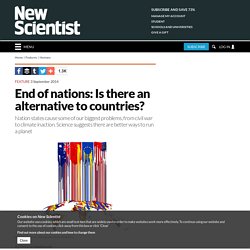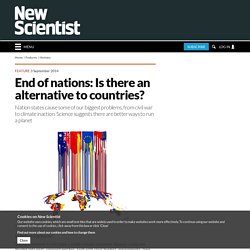

Comment Vladimir Poutine risque de provoquer la fin de l'Otan ou une guerre mondiale. Il y a quatre ans, je prédisais l'invasion russe en Ukraine.

Voici mon nouveau pronostic qui, pour beaucoup, sonnera comme une évidence: les pays Baltes seront les prochains sur la liste. L'invasion ne sera probablement pas directe. Et c'est là que la présidence Trump connaîtra sa première et plus importante mise à l'épreuve. In our world beyond nations, the future is medieval. FOR most of the past thousand years, there were no nations in Europe.

It was a hotchpotch of tribal groupings, feudal kingdoms, autonomous cities and trading networks. Over time, the continent’s ever more complex societies and industries required ever more complex governance; with the French Revolution, the modern nation state was born. Now the nation’s time may be drawing to a close, according to those who look at society through the lenses of complexity theory and human behaviour.
There is plentiful evidence for this once you start looking (see “End of nations: Is there an alternative to countries? “). “The nation’s time may be drawing to a close, and the medieval way of running things due for a comeback” Is this a prospect to welcome or dread? Advertisement Some believe, instead, that the medieval way of running things is due for a comeback. Small nations could also thrive, particularly if they distinguish themselves through high-tech expertise (New Scientist, 31 May 2014, p 12). End of nations: Is there an alternative to countries?
Map: Norman Kirby; Photograph: Tatsuro Nishimura By Debora MacKenzie Try, for a moment, to envisage a world without countries.

End of nations: Is there an alternative to countries? Map: Norman Kirby; Photograph: Tatsuro Nishimura By Debora MacKenzie Try, for a moment, to envisage a world without countries.

Imagine a map not divided into neat, coloured patches, each with clear borders, governments, laws. Try to describe anything our society does – trade, travel, science, sport, maintaining peace and security – without mentioning countries. Try to describe yourself: you have a right to at least one nationality, and the right to change it, but not the right to have none. Those coloured patches on the map may be democracies, dictatorships or too chaotic to be either, but virtually all claim to be one thing: a nation state, the sovereign territory of a “people” or nation who are entitled to self-determination within a self-governing state.
My “top ten” books every student of International Relations should read. Last week Tom Ricks offered us his “Top Ten list” of books any student of military history should read.

The FP staff asked me to follow suit with some of my favorites from the world of international politics and foreign policy. What follows aren’t necessarily the books I’d put on a graduate syllabus; instead, here are ten books that either had a big influence on my thinking, were a pleasure to read, or are of enduring value for someone trying to make sense of contemporary world politics. But I’ve just scratched the surface here, so I invite readers to contribute their own suggestions.
L’individualisme moral face au Djihadisme. Par Hadrien Gournay.

Le principe des libéraux est de ne porter de jugement que sur des individus et non sur des groupes, et de ne pas faire peser sur les premiers une responsabilité retombant sur d’autres individus de la même communauté en vertu de ce lien communautaire. Sanctionner tout un clan pour une faute que l’un des ses membres aurait commise est absolument contraire à leurs principes. Lorsque la question porte sur l’Islam et le Djihadisme (entendu comme courant d’opinion justifiant le terrorisme), ils rappellent qu’on ne peut faire retomber la responsabilité du Djihadisme moderne sur la majorité des musulmans respectueuse des libertés ou au moins pacifique.
Ces principes constituent l’individualisme moral. Pourtant, se contenter de cette grille de lecture unique pour analyser les situations géopolitiques et les risques de conflit fait courir le risque d’en négliger des aspects essentiels et de ne pouvoir juger au mieux leurs possibilités d’évolution. ThinkerView. Al Akhbar English.